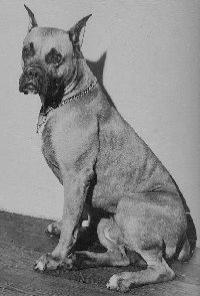Pirate Jean Lafitte's participation in the Battle of New Orleans is well known and often
remembered. But the role of Dominque You, the boldest and most flamboyant of Lafitte's men,
is usually overlooked - which is odd, when you consider how much Gen. Andrew Jackson
valued You's contribution and admired his skill and bravery. The General reportedly said that
he "would storm the gates of hell with Dominique You."
It's thought that You was a half-brother of Jean and Pierre Lafitte and that his real name was
Alexandre Lafitte. He was born in the French colony of Saint-Dominque in 1775, but, like his
famous half-brothers, both his family history and the circumstances surrounding his early
childhood are unclear.
Dominique You made his way to France at a young age, possibly as a cabin boy, and was there
during the French Revolution. While still a teenager, he joined an artillery company of the
French Army. Some time later, he returned to the Caribbean, where he quickly developed a
reputation as a daring privateer.
There's a difference between "privateer" and "pirate" and it's said that Jean Lafitte bristled at
being labeled a pirate. He claimed to have letters of marque for the conquests he made. A
letter of marque was a government license authorizing a person (a privateer) to attack and
capture enemy vessels and bring them before admiralty courts. Cruising for prizes with a letter
of marque may not have been the most noble of careers, but, at the time, it wasn't considered
dishonorable (as unlicensed piracy certainly was). As you might guess, not all countries agreed
with the rules of privateering - including Spain, England and the U.S., who all had arrest
warrants out for the Lafittes (even though Lafitte insisted he'd never attacked a U.S. ship).
Pirate or privateer, whichever you choose, Dominique You joined forces with Jean Lafitte and
was often in his and Pierre's company, both in New Orleans and at their stronghold on Barataria
Bay. You earned a reputation for unmatched boldness and soon became the pirates' principal
captain. It was more than likely Dominique You who acquired the nickname "Terror of the
Gulf." In the years since, people have used the name in reference to Jean Lafitte, but, since
Jean was less active on the open sea than Pierre or Dominique and Dominique had the wider
reputation for conquest, it was probaby You who actually earned it.
When Louisiana was threatened by British invasion during the War of 1812, the Lafitte brothers
volunteered their services to Gen. Andrew Jackson. Gen. Jackson wisely accepted.
Dominique You was appointed commander of an artillery company, which he formed with the
best gunners of Lafitte's ships. At the Battle of New Orleans, You distinguished himself to such
a degree that, according to Gen. Jackson, Captain You's accuracy helped significantly disrupt
British command-and-control. Dominique You and his men were mentioned in Gen. Jackson's
report as having shown "uncommon gallantry and skill in the field."
remembered. But the role of Dominque You, the boldest and most flamboyant of Lafitte's men,
is usually overlooked - which is odd, when you consider how much Gen. Andrew Jackson
valued You's contribution and admired his skill and bravery. The General reportedly said that
he "would storm the gates of hell with Dominique You."
It's thought that You was a half-brother of Jean and Pierre Lafitte and that his real name was
Alexandre Lafitte. He was born in the French colony of Saint-Dominque in 1775, but, like his
famous half-brothers, both his family history and the circumstances surrounding his early
childhood are unclear.
Dominique You made his way to France at a young age, possibly as a cabin boy, and was there
during the French Revolution. While still a teenager, he joined an artillery company of the
French Army. Some time later, he returned to the Caribbean, where he quickly developed a
reputation as a daring privateer.
There's a difference between "privateer" and "pirate" and it's said that Jean Lafitte bristled at
being labeled a pirate. He claimed to have letters of marque for the conquests he made. A
letter of marque was a government license authorizing a person (a privateer) to attack and
capture enemy vessels and bring them before admiralty courts. Cruising for prizes with a letter
of marque may not have been the most noble of careers, but, at the time, it wasn't considered
dishonorable (as unlicensed piracy certainly was). As you might guess, not all countries agreed
with the rules of privateering - including Spain, England and the U.S., who all had arrest
warrants out for the Lafittes (even though Lafitte insisted he'd never attacked a U.S. ship).
Pirate or privateer, whichever you choose, Dominique You joined forces with Jean Lafitte and
was often in his and Pierre's company, both in New Orleans and at their stronghold on Barataria
Bay. You earned a reputation for unmatched boldness and soon became the pirates' principal
captain. It was more than likely Dominique You who acquired the nickname "Terror of the
Gulf." In the years since, people have used the name in reference to Jean Lafitte, but, since
Jean was less active on the open sea than Pierre or Dominique and Dominique had the wider
reputation for conquest, it was probaby You who actually earned it.
When Louisiana was threatened by British invasion during the War of 1812, the Lafitte brothers
volunteered their services to Gen. Andrew Jackson. Gen. Jackson wisely accepted.
Dominique You was appointed commander of an artillery company, which he formed with the
best gunners of Lafitte's ships. At the Battle of New Orleans, You distinguished himself to such
a degree that, according to Gen. Jackson, Captain You's accuracy helped significantly disrupt
British command-and-control. Dominique You and his men were mentioned in Gen. Jackson's
report as having shown "uncommon gallantry and skill in the field."
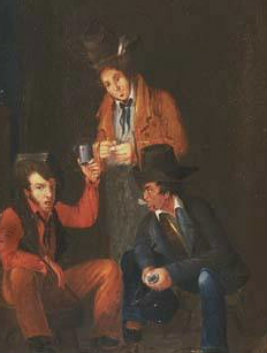
| Jean Lafitte, seated on the left; Pierre Lafitte, standing; Dominique You, seated on the right; painting by John Wesley Jarvis, 1821. |
From a newspaper article on the anniversary of his death many decades later:
"When Dominique You died, he had such a funeral as no one had had before in New Orleans.
The entire Legion [an organization of the Orleans Artillery, of which Dominique You had been a
member] shouldered their arms to render him military honors and an immense crowd of citizens
accompanied his body to its last resting place. He sleeps in a plain brick tomb not far from Gen.
Plauche, in the ancient St. Louis No. 2. You was the most colorful of the many colorful
characters whose exploits made of early Louisiana history a brilliant mosaic of romance and
tragedy, high hopes and shattered dreams, love and hate, bloodshed and bravery. Today, no
flowers are heaped on his grave, only a single, tiny fern which, in years past, some kindly hand
has planted."
"When Dominique You died, he had such a funeral as no one had had before in New Orleans.
The entire Legion [an organization of the Orleans Artillery, of which Dominique You had been a
member] shouldered their arms to render him military honors and an immense crowd of citizens
accompanied his body to its last resting place. He sleeps in a plain brick tomb not far from Gen.
Plauche, in the ancient St. Louis No. 2. You was the most colorful of the many colorful
characters whose exploits made of early Louisiana history a brilliant mosaic of romance and
tragedy, high hopes and shattered dreams, love and hate, bloodshed and bravery. Today, no
flowers are heaped on his grave, only a single, tiny fern which, in years past, some kindly hand
has planted."
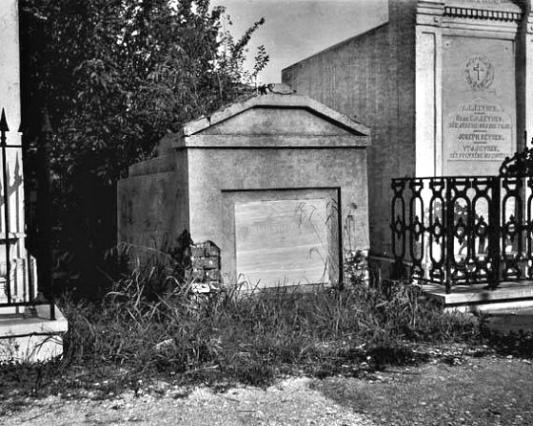
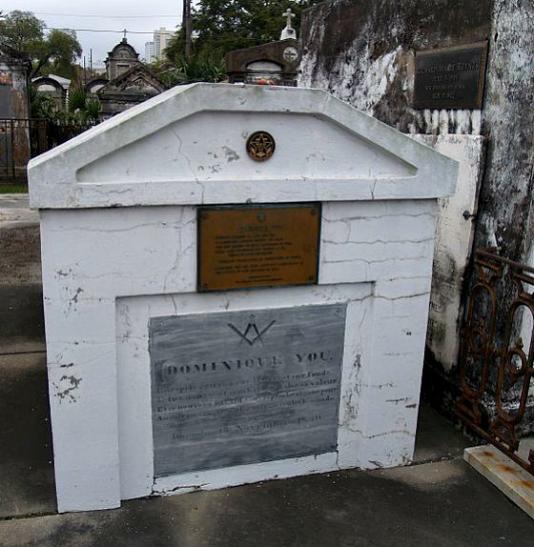
| Bold Privateer Dominique You |
| Above: By 1930, a hundred years after his death, Dominique You's tomb had begun to show its age. Since that time, restoration work has been done and an English translation of the original French inscription has been added. |
When I was nine, my father bought a Boxer puppy, who, my dad always liked to say,
possessed a far more aristocratic lineage than he did. Believing that the puppy's name
should reflect his illustrious bloodline, my dad decided that it was to be "Pierre Dominique
You," in honor of Jean Lafitte's two brothers, because of their heroism at the Battle of New
Orleans. My dad and I (and the puppy) went to St. Louis No. 2 Cemetery to visit the tomb of
the original Dominque You and we listened with rapt attention (well, I listened - the puppy,
not so much) to my father's thrilling story of the Battle of New Orleans. It's because of the
memory of that summer morning my dad and I shared at old St. Louis No. 2 that I will always
have a soft spot in my heart for Dominque You - both the Corsair and the Boxer. -- Nancy
possessed a far more aristocratic lineage than he did. Believing that the puppy's name
should reflect his illustrious bloodline, my dad decided that it was to be "Pierre Dominique
You," in honor of Jean Lafitte's two brothers, because of their heroism at the Battle of New
Orleans. My dad and I (and the puppy) went to St. Louis No. 2 Cemetery to visit the tomb of
the original Dominque You and we listened with rapt attention (well, I listened - the puppy,
not so much) to my father's thrilling story of the Battle of New Orleans. It's because of the
memory of that summer morning my dad and I shared at old St. Louis No. 2 that I will always
have a soft spot in my heart for Dominque You - both the Corsair and the Boxer. -- Nancy
| Pierre Dominique You |
| The link to this page is: http://old-new-orleans.com/NO_Dominque_You.html Back to Old New Orleans Whispers - Home |
After the Battle of New Orleans, in consideration of the help provided, all charges of piracy
were dropped and the Lafitte brothers were given a full pardon by President James Madison.
Dominique You was a supporter of Andrew Jackson's and he did much to pacify the French
population of New Orleans and secure the cooperation of those who might otherwise have
caused trouble for the newly arriving Americans.
He operated a schooner out of Galveston for awhile, but returned to New Orleans and moved to
the Faubourg Marigny neighborhood, where he lived a quiet life. I've read that he enjoyed
sitting on the steps of his house, telling pirate stories to the neighborhood children. He was a
very popular figure in the city and served for a time as a city alderman.
You was reportedly chosen to lead an attempt to rescue Napoleon from St. Helena and bring
him to New Orleans, but just before he sailed, word was received of Napoleon's death.
Gen. Jackson came to New Orleans seven years after the Battle of New Orleans and one of the
first people he asked for was Dominique You.
Toward the end of his life, You fell on hard times, but he was too proud to ask anyone for
assistance. He died destitute on November 14, 1830. It was only then that people discovered
how dire his financial situation had been.
It was as though to make up in death what they were unable to give in life that the citizens of
New Orleans provided Dominique You with a full military funeral, complete with the pomp and
circumstance befitting a hero of the Battle of New Orleans. Thousands of people attended a
funeral Mass at St. Louis Cathedral and followed in somber procession to St. Louis No. 2
Cemetery, where Captain You was laid to rest. All expenses were paid by the citizens of New
Orleans.
The inscription on his tomb is a quote from Voltaire:
"Intrepid warrior on land and sea, in a hundred combats showed his valor. Without reproach or
fear, he could have witnessed the ending of the world without trembling."
-- Nancy
were dropped and the Lafitte brothers were given a full pardon by President James Madison.
Dominique You was a supporter of Andrew Jackson's and he did much to pacify the French
population of New Orleans and secure the cooperation of those who might otherwise have
caused trouble for the newly arriving Americans.
He operated a schooner out of Galveston for awhile, but returned to New Orleans and moved to
the Faubourg Marigny neighborhood, where he lived a quiet life. I've read that he enjoyed
sitting on the steps of his house, telling pirate stories to the neighborhood children. He was a
very popular figure in the city and served for a time as a city alderman.
You was reportedly chosen to lead an attempt to rescue Napoleon from St. Helena and bring
him to New Orleans, but just before he sailed, word was received of Napoleon's death.
Gen. Jackson came to New Orleans seven years after the Battle of New Orleans and one of the
first people he asked for was Dominique You.
Toward the end of his life, You fell on hard times, but he was too proud to ask anyone for
assistance. He died destitute on November 14, 1830. It was only then that people discovered
how dire his financial situation had been.
It was as though to make up in death what they were unable to give in life that the citizens of
New Orleans provided Dominique You with a full military funeral, complete with the pomp and
circumstance befitting a hero of the Battle of New Orleans. Thousands of people attended a
funeral Mass at St. Louis Cathedral and followed in somber procession to St. Louis No. 2
Cemetery, where Captain You was laid to rest. All expenses were paid by the citizens of New
Orleans.
The inscription on his tomb is a quote from Voltaire:
"Intrepid warrior on land and sea, in a hundred combats showed his valor. Without reproach or
fear, he could have witnessed the ending of the world without trembling."
-- Nancy
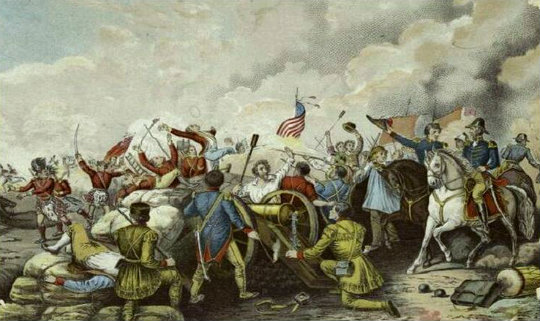
| Battle of New Orleans - American artillery unit firing at British soldiers; Gen. Jackson on the right; painting by Dennis Malone Carter - ca. 1856. |
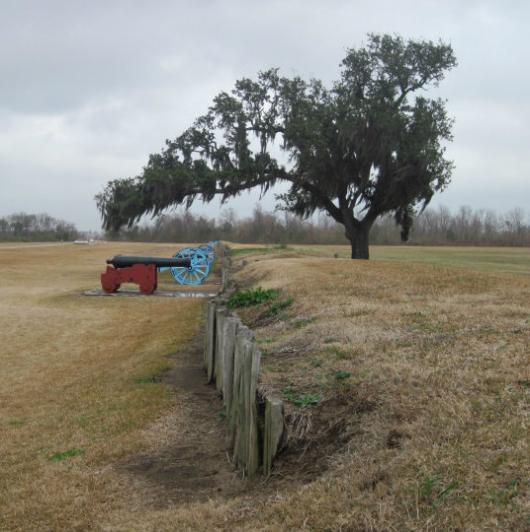
| A misty morning at the American line on the Chalmette Battlefield: cannons waiting for the return of Gen. Jackson's army - the unlikely heroes who saved the city of New Orleans from certain destruction at the hands of the British. |
